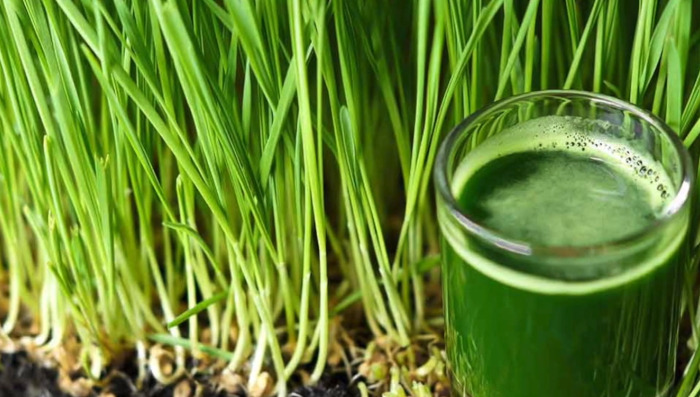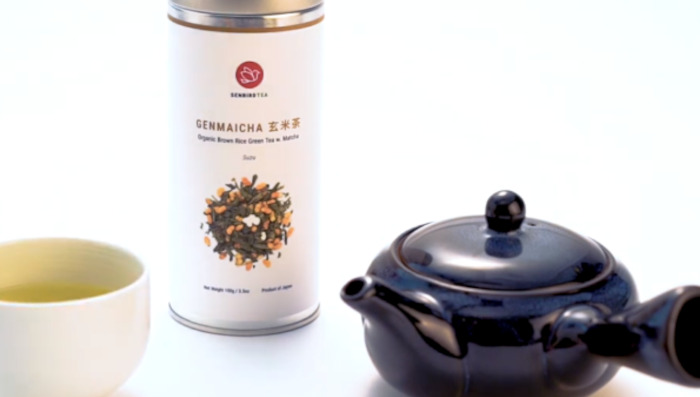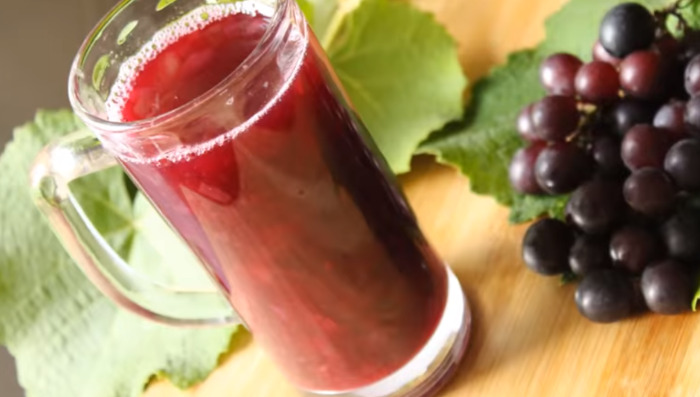Golden beets, often referred to as yellow beets, are a vibrant vegetable packed with essential nutrients. Unlike their red counterparts, they boast a sweeter, milder flavor, making them a favorite for many. These beets are not just about taste; they’re a powerhouse of health benefits. Rich in vitamins A and C, they’re also an excellent source of potassium and manganese.
But what truly sets them apart? Their high dietary fiber content supports digestive health and helps regulate blood sugar levels. Plus, the antioxidants they contain combat oxidative stress, reducing inflammation in the body. When you consume golden beets, you’re not just enjoying a delicious vegetable; you’re nourishing your body. Whether you roast them, juice them, or toss them in a salad, they’re a versatile addition to any diet. So, next time you’re at the market, give these yellow wonders a try. They’re not just a treat for the palate but a boon for overall well-being.
Health benefits of Golden Beet:
Incorporating golden beets into your diet is more than just a culinary choice; it’s a commitment to holistic health. Each bite is a step towards a healthier you. So, the next time you’re meal planning, remember these benefits and let golden beets take center stage.
1.Heart Health Booster:
Golden beets are a heart’s best friend. Their high potassium content plays a pivotal role in regulating blood pressure, ensuring the heart functions optimally. By incorporating these beets into your diet, you’re taking a proactive step towards cardiovascular wellness.

2. Digestive Aid:
Struggling with digestion? Turn to golden beets. Their impressive dietary fiber content not only promotes healthy digestion but also combats constipation. It’s nature’s way of ensuring everything runs smoothly.
3. Immunity Enhancer:
When flu season hits, golden beets are your shield. Packed with vitamin C, they bolster the immune system, prepping it to ward off infections. It’s like having a personal bodyguard against germs.
4. Brain Functionality Support:
Golden beets are brain food, literally. The antioxidants they house protect brain cells from potential damage, paving the way for improved cognitive function. Think clearer, remember more, and focus better.
5. Natural Detoxifier:
Want to cleanse your system? Golden beets are your go-to. They support liver function, helping flush out toxins from the body. It’s a natural detox, without the hefty price tag of commercial cleanses.
6. Vision, Lungs, and Skin Promoter:
The vitamin A in golden beets does wonders. It’s essential for healthy vision, lung function, and skin vitality. So, not only do you feel good on the inside, but you look radiant on the outside.
Recipe of Golden beet juice:
Ingredients:
Gathering these ingredients is the first step to crafting a drink that’s not just refreshing but also a nutritional dynamo.
- Golden Beets (2 large ones): The heart of our juice. Golden beets not only infuse the drink with a sunlit hue but also bring a delightful sweetness. They’re a hydration hero and a source of essential nutrients like Vitamin B6 and manganese.

- Oranges (3 medium-sized): A burst of citrusy freshness. Oranges not only elevate the taste but are also a powerhouse of Vitamin C and potassium. They add that zesty punch and ensure you’re sipping on a dose of antioxidants.
- Carrots (5-6 medium-sized): These crunchy delights add depth to our juice. Packed with Vitamin A, they’re the guardians of our vision, skin, and overall health. Their natural sweetness complements the beets perfectly.
- Turmeric (1-inch piece): This isn’t just about color. Turmeric is a medicinal marvel, known for its anti-inflammatory properties. It’s the ingredient that turns our juice from good to great, health-wise.
- Black Pepper (a pinch, optional): Think of this as the key that unlocks turmeric’s full potential. It enhances turmeric absorption, ensuring you get the maximum benefit from every sip.
Equipment:
Following are the equipment used for making Golden Beet juice:
Cold Pressed Juicer: The star player in our juice-making process. A high-quality cold pressed juicer, like the Kuvings C7000, ensures that the juice retains maximum nutrients. It’s the tool that guarantees you’re sipping on raw, vegan, and nutrient-rich goodness.
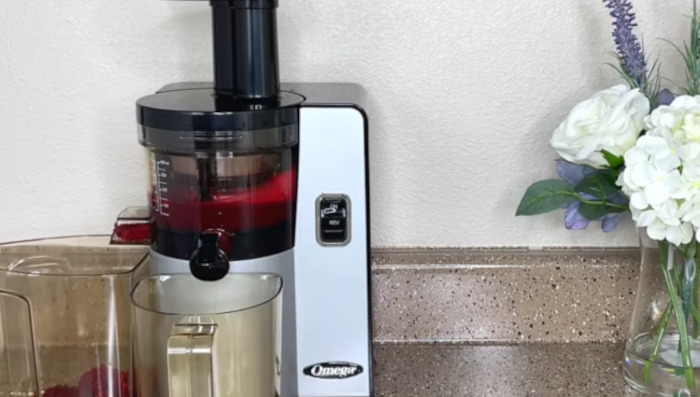
Chef Knife: Precision is key. A sharp chef knife ensures that your vegetables are chopped just right, optimizing the juicing process. Remember, the size and consistency of your chopped ingredients can influence the juice’s texture and flavor.
Cutting Board: A sturdy cutting board provides the perfect base for your chopping endeavors. It’s essential for safety and ensures that the nutrients from the veggies don’t get wasted.
Measuring Cups and Spoons: Accuracy matters. To get the taste and health benefits spot on, you’ll need to measure out ingredients like turmeric and black pepper. These tools ensure you’re not overdoing or underusing any ingredient.
Serving Glasses: Presentation is half the experience. Once your juice is ready, pour it into a clear glass. Watching the vibrant colors blend is a treat for the eyes, setting the stage for a delightful sip.
Instructions:
With these steps, you’re not just creating a drink; you’re crafting a wellness experience.
- Preparation: Begin by gathering all your ingredients and equipment. This ensures a smooth flow once you start the process.
- Washing: Thoroughly wash the golden beets, carrots, oranges, and turmeric. Given that we’re keeping the skin on, it’s crucial to ensure they’re free from any dirt or pesticides.
- Chopping: Using your chef knife, roughly chop the golden beets into large cubes. Remember, you can juice the beet greens too, but it might alter the juice’s color. Cut the carrots into one-inch pieces, and the turmeric into smaller bits. For the oranges, peel them first and then halve them.
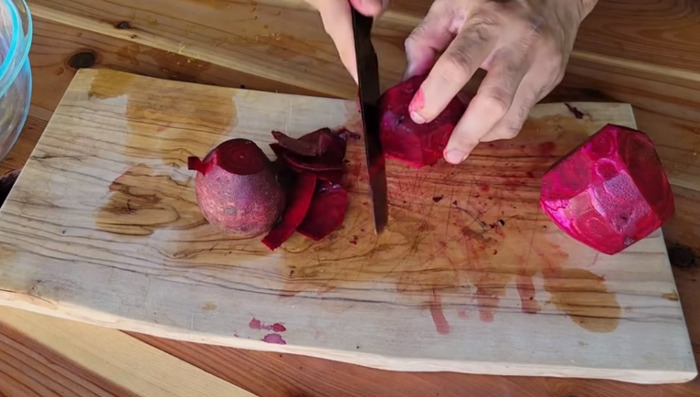
- Juicing: Turn on your cold pressed juicer. Start by adding the firmer ingredients like beets and carrots, followed by the juicier ones like oranges. This alternating method ensures maximum juice extraction.
- Flavor Boost: If you’re looking to enhance the juice’s health benefits, consider adding a pinch of black pepper. It amplifies the absorption of turmeric by a staggering 2000%.
- Serving: Once all ingredients are juiced, pour the vibrant concoction into serving glasses. For a refreshing twist, serve it over ice.
- Enjoy: Take a moment to savor the rich flavors and the health-packed goodness of your homemade golden beet juice.
Ways to use Golden Beets:
Golden beets are versatile and can elevate the nutritional value and taste of various dishes. Whether you’re a seasoned chef or someone just starting in the kitchen, incorporating golden beets can add a gourmet touch to your meals.
- Roasting: One of the most popular methods. Toss sliced golden beets with a bit of olive oil, salt, and pepper. Roast them until they’re tender and have a caramelized exterior. The result? A side dish that’s both sweet and savory.
- Raw in Salads: For a fresh twist, shred raw golden beets and mix them with your favorite greens. Their natural sweetness pairs well with tangy vinaigrettes, and they add a vibrant hue to any salad bowl.
- Smoothies: Looking for a nutrient boost in your morning drink? Blend cooked golden beets with fruits like strawberries or bananas. Not only do they enhance the color, but they also add a subtle earthy flavor.
- Soups: Golden beet soup is both comforting and nourishing. Combine them with ingredients like onions, vegetable broth, and your choice of spices. Once cooked, blend everything for a creamy, delightful soup.
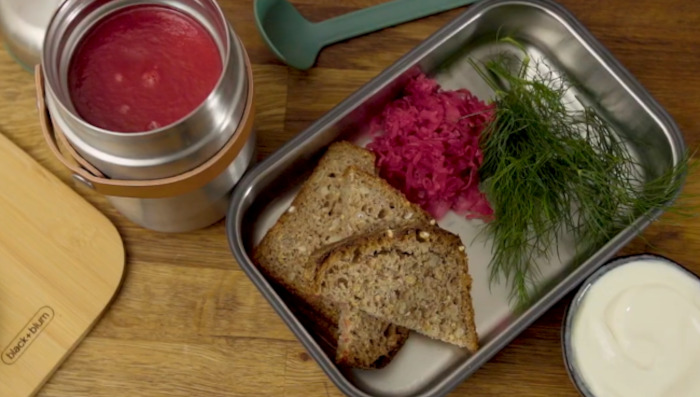
- Juicing: As we’ve discussed, golden beets are fantastic for juicing. They offer a slightly sweet flavor, making them a great addition to various juice combinations.
- Pickling: For those who enjoy tangy treats, pickled golden beets are a must-try. Their natural sweetness balances out the vinegar, resulting in a snack that’s both sweet and sour.
Nutritional facts of Golden beet:
Golden beets are not just vibrant in color but also in nutrition.
Calories: A medium-sized golden beet contains approximately 58 calories. It’s a low-calorie option, making it perfect for those watching their weight.
Dietary Fiber: Offering about 2 grams per serving, golden beets can aid in digestion and help regulate blood sugar levels.
Vitamins: They’re a rich source of:
- Vitamin A: Essential for vision, immune function, and skin health.
- Vitamin C: Boosts the immune system and acts as an antioxidant.
Minerals: Golden beets are packed with essential minerals, including:
- Potassium: Around 442 mg per serving, it’s vital for heart health and muscle function.
- Manganese: A trace mineral that plays a role in bone health and blood clotting.
Antioxidants: These compounds help combat oxidative stress in the body. Golden beets are particularly rich in betalains, which have anti-inflammatory properties.
Dietary Nitrates: These naturally occurring compounds can help lower blood pressure and improve overall heart health.
Folate: With about 20% of your daily recommended intake, folate is crucial for DNA synthesis and repair.
Side Effects of Golden beets:
Golden beets, like all foods, can have side effects in certain individuals or when consumed in large quantities.
- Beeturia: A harmless condition where urine turns pink or red after consuming beets. It’s a result of certain compounds not being broken down in the digestive system.
- Kidney Stones: Those prone to kidney stones might want to consume golden beets in moderation. They contain oxalates, which can contribute to stone formation.
- Stomach Upset: In some individuals, especially if consumed in large quantities, beets can cause gastrointestinal discomfort or bloating.
- Blood Pressure Fluctuation: Due to their high nitrate content, golden beets can lower blood pressure. While beneficial for many, those on blood pressure medications or with naturally low blood pressure should be cautious.
- Stool Discoloration: Just as they can change the color of urine, beets can also lead to red or pink stools. It’s harmless but can be alarming if unexpected.
- Blood Sugar Levels: Golden beets have natural sugars. Diabetics or those watching their sugar intake should be aware and consume them in moderation.
Conclusion:
Golden beets, a vibrant and nutritious vegetable, offer a plethora of health benefits, from supporting heart health to enhancing brain function. When juiced, they provide a refreshing drink packed with vitamins and minerals. However, like all foods, they come with their set of precautions. While they can lower blood pressure and offer numerous nutrients, overconsumption might lead to minor side effects like beeturia or concerns for those prone to kidney stones.
The key is moderation and understanding how they fit into your unique diet. Whether you’re roasting them, adding them to salads, or juicing them for a health boost, golden beets are a versatile addition to any meal plan. Remember to consult with a healthcare professional if you have specific health concerns, but for most, the benefits of this superfood are clear. Dive in and enjoy the myriad ways golden beets can enhance your health and culinary experiences.
FAQs:
Which is better for you, red or golden beets?
Both red and golden beets pack a nutritional punch, but their benefits slightly differ. Red beets have more antioxidants, thanks to their deep color, which can help combat free radicals. Golden beets, on the other hand, are slightly sweeter and less earthy, making them a favorite in culinary dishes. They also contain betalains, promoting anti-inflammatory responses. Ultimately, the choice between red and golden beets boils down to personal preference and the specific health benefits you’re seeking. Both are stellar choices for a health-conscious kitchen.
Who should avoid beetroot?
While beetroot is nutritious for many, certain individuals should be cautious. Those prone to kidney stones might want to limit beetroot due to its oxalate content. Additionally, individuals with low blood pressure should be aware, as beetroot can further lower it. If you’re on blood thinners, take medical advice, beetroot’s vitamin K can affect medication efficacy. Lastly, if you experience beet-induced digestive discomfort, it might be best to reduce intake.




